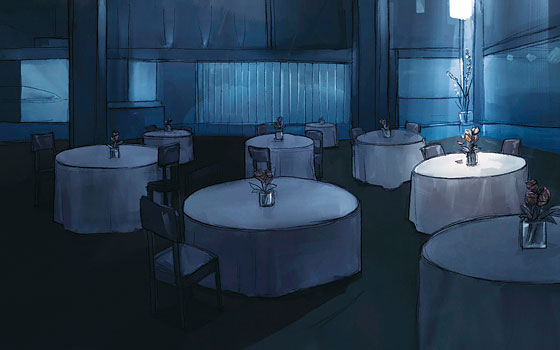
The room behind the bar at Le Cirque was originally intended to be Siberia, an area to accommodate the overflow of commoners who couldn’t make the cut for the grand dining room. But these days, the smaller back room, which features cheaper food and an occasional band, is somewhat lively, while the main area has plenty of vacancies. “I remember happy times when we were on 65th Street,” says owner Sirio Maccioni, surveying the 16,000-square-foot room, with its 27-foot-high ceilings. “Maybe I should have done something a little smaller and less expensive. We don’t make much money in New York. But we are doing well in the Dominican Republic, and in Las Vegas. They finance this.” He’s sent messages to regular customers he hasn’t seen in a while, saying he misses them.
It’s not surprising that New York’s fanciest restaurants are having trouble filling their seats during this recession. But as it wears on, a certain elevated culinary ecosystem that has long characterized metropolitan life has begun to feel threatened. Last month saw the shuttering of Lever House, Town, and Atria. Even Le Bernardin, which has been reviewed on four separate occasions by the Times and consistently earns four stars, has not made a decision yet on renewing its lease when it ends in 2011. Even in these cash-strapped times, “there are still a lot of birthdays and occasions to celebrate,” says owner Maguy Le Coze. “We are careful about expenses, but there are things when you are four stars that you cannot give up. At a certain point you have to say, ‘Should I stop now and do what I like?’ ”
The chic Madison Avenue café scene has enjoyed better days. La Goulue has lost its lease and is closing next month, Frederick’s nearby has filed Chapter 11, and Nello’s has lowered its exorbitant prices for the first time since opening in 1991. Notoriously costly Harry Cipriani has been so humbled by nights when the restaurant is less than thronged that it has just dropped prices by about 20 percent. Up at the Time Warner food court, Per Se not only has tables that can be booked the same day, it has introduced a less expensive “salon menu,” while a recent visitor to Masa, where the $400 prix fixe is still in place, reported fewer than twenty diners. Downtown, Chanterelle is rumored to be seeking investors.
Meanwhile, expense-account lunches are under attack. To fight back, Le Cirque has introduced a $45 prix fixe at lunch in the main dining room ($28 in Siberia.) L’Atelier de Joël Robuchon at The Four Seasons Hotel dropped lunch altogether.
“Restaurants are giving away food for free,” says Lois Freedman, who runs the four-star Jean Georges, along with Jean-Georges Vongerichten’s other city restaurants. “The volume is up, but there is a great reduction in revenue.” That said, you have to maintain your standards. “If you are three or four stars, you have to use crystal and silver and linen, and now you have to lower your prices. A three-star review is the kiss of death these days. I have been trying to find creative ways to in-source; I am now doing the restaurants’ flowers myself.” Megu owner Hiro Nishida thought about getting rid of linen tablecloths and napkins. “Then I thought, It’s 86 cents for each napkin and it changes the whole feel of a place. We will save somewhere else.”
The question is whether the recession is the primary cause of high-end restaurants’ troubles, or whether it’s merely hastened a kind of larger cultural shift away from formality and traditional exactitude—at least for the moment. “Now people are happy to get great food sitting on a stool at Momofuku,’’ notes restaurant-industry consultant Clark Wolf. “Instead of three waiters on the table, they have one androgynous waitperson with a well-placed tattoo.” Drew Nieporent, Danny Meyer, and Lobel’s are serving at ballfields. “There was a time they wouldn’t have been caught dead doing that.”
Remember those ladies who’d lunch? “Today they go to the gym maybe, and drink vegetable juice,” says Maccioni. “Life is no more the same. People say it is going to change, but it is not going to change. Things have been restructured, and we have to get used to it.”
Have good intel? Send tips to intel@nymag.com.